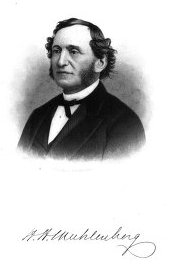
Hiester H. Muhlenberg, M.D., Physician and Financier, was born in Reading, Pennsylvania, January 15th, 1812. His father was Henry A. Muhlenberg, whose biography appears elsewhere in this work, and his mother was a daughter of Governor Hiester of this State, whose life also finds a record in these pages. His primary education was received in his native city, under the Rev. John F. Grier, an eminent classical scholar. Subsequently, he entered and attended the Sophomore class, under the Rev. Dr. Neill, at Dickinson College, where he graduated in 1829. He then studied medicine, under Dr. Thomas Harris, a naval surgeon of high reputation, and graduated at the University of Pennsylvania in 1832. Thereupon he commenced the practice of his profession in Reading, continuing the same for about eight years. After the panic of 1837 his remarkable financial ability was first brought into prominent notice, as he then took charge of the affairs of the Farmers' Bank of Reading for the purpose of restoring them to a proper condition, expecting to resume his practice in the course of a year or two. This intention, however, was not carried out, as in March, 1842, he was elected cashier of the bank, a position he continues to hold. His capacity carried the bank successfully through the great panic of 1857, through the troubles incident to the Rebellion, and, finally, through the severe crisis of 1873. During all these monetary difficulties the institution has been able to maintain its ground and secure the entire confidence of the public. He served in the first councils which changed the Borough of Reading to a city, and had been previously a member of the Borough Councils for nine or ten years. He was the leading member of the Finance Committee, and largely instrumental in reducing the municipal debts. These services established his well-deserved reputation as an able man of business and skillful financier. He entered the army, under the old volunteer system, as a private, but worked his way up from the ranks to be Lieutenant; and during the riots of 1844 proceeded to Philadelphia from Reading with that rank, as a part of William H. Keim's command. In the late war, though somewhat advanced in years, the same patriotic spirit impelled him to enter the emergency volunteers at the battle of Antietam, and subsequently to join the thirty days' re-enlistment during the excitement caused by the battle of Gettysburg. He is one of the three surviving (out of twelve) Trustees of the Charles Evans Cemetery Company, and was its President for many years. He served (about 1840) as Director and President of the Reading Water Company, and by his able management maintained the high character of that company, as indeed he has always done of every institution to which he has given his services--invariably gratuitously, all his public positions, official or otherwise, having been honorary ones. He has been a member of the Vestry of the Lutheran Church since 1835, and in religious matters has displayed the same energy and talent as in enterprises, patriotic or otherwise, having for their object the benefit of the city or the welfare of the country at large. Since about 1860, he has been interested in the Leesport Iron Works, at Leesport, and with Mr. Eckert's Iron Works. Besides his other attainments, he is a good German scholar and a fair French one. In short, he is possessed of superior and varied talents, while the good he has accomplished would furnish an exemplary record not merely for one life but for several. He has been married twice: first to Amelia Hanold, whose father was a citizen of Louisiana at the time of its purchase, and afterwards to Catharine S. Hunter, of Berks county, by whom he has seven children, all young.

Source: The Biographical Encyclopedia of Pennsylvania of the Nineteenth Century. Philadelphia: Galaxy Publishing Co., 1874, pp. 249.
Contributed by: Nancy.